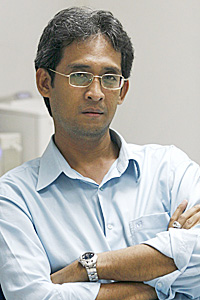
The recent massive crackdown on recycling factories processing hazardous electronic waste allegedly smuggled from abroad seems to be just the tip of the iceberg.
Last week, police, local authorities and Revenue Department officials jointly raided five electronic recycling plants in Chachoengsao to stamp out pollution caused by industrial waste.
Police also raided another factory situated in Lat Krabang industrial estate in Bangkok for allegedly smuggling electronic waste into the country.

Soonruth Bunyamanee is acting editor, Bangkok Post.
All of the plants are said to be operated by foreign investors, including Chinese, Taiwanese, Singaporean and South Korean nationals.
According to police, these plants were supplied electronic waste by three companies jointly operated by Thais and foreigners. The amounts smuggled into the country by the three companies has sharply increased this year. Each of them imported between 400 and 700 tonnes of electronic waste last year but the amount increased to more than 10,000 tonnes each during just the first half of this year.
The waste illegally brought into the country includes old wire, computers, appliances and electronic circuits and is usually either burned or melted by acid to extract valuable metals.
This processing has resulted in pollution in nearby communities.
Most of the recycling plants do not acquire a waste-recycling licence and the business type they are registered under has nothing to do with hazardous waste management.
In fact, these shady companies are just a small and noticeable part of a much greater problem.
According to police investigation, in the first half of this year, more than 100,000 tonnes of electronic waste was brought into Thailand (through both declared imports and smuggling), compared to about 70,000 tonnes for the whole of last year.
Are authorities alarmed about this unusually sharp increase?
How could these operators smuggle such a massive amount of electric waste into Thailand without the acknowledgement of authorities?
The government and police need to probe all parties involved in this environmental crime, not only private operators.
I wonder whether customs officials impose stringent measures on the importers of potentially toxic waste the same way they do with individual passengers?
Previously, the Customs Department attempted to introduce strict goods declaration regulations, which were later revoked due to heavy criticism. Departing passengers would have been expected to register valuable items such as watches, cameras or computer laptops to customs at airports and declare them upon return. It was a bid to prevent luxury goods being smuggled into the country without import duties being paid.
While some electronic waste is processed, the rest of it must be disposed of. So the bigger question is where were these massive amounts of electronic waste dumped?
China banned the import of several waste materials for recycling last year.
This is believed to be a reason why recycling business operators have relocated to other countries, particularly Thailand where the government has been eager to promote foreign investment, particularly in the eastern region under the Eastern Economic Corridor (EEC) scheme.
Meanwhile, sources from the Industrial Works Department suggest that the number of Chinese investors applying for permission to build plants in eastern provinces has significantly increased. Several of them are believed to be recycling facilities even though their applications specified other types of business.
Under the government's promotion scheme, investors get unprecedented privileges if they invest in the three EEC provinces, namely Chon Buri, Rayong and Chachoengsao. The benefits include a land lease of up to 99 years, freedom to trade in foreign currencies, a permit to operate businesses currently prohibited for foreigners and, most importantly, a shortened process for undergoing an environmental impact assessment, known as the EIA fast track.
In addition, the National Council for Peace and Order issued an order on Oct 25 last year enabling the Department of Public Works and Town & Country Planning to complete new city plans for land, industrial infrastructure and public utility development for the three provinces within six months of their approved by an EEC policy committee.
This approach has raised deep concerns among residents who fear the environmental impacts of EIA fast-track businesses and are unhappy about the lack of public participation.
It may be premature to blame the EEC scheme for the smuggling of massive amounts of electronic waste into the country, but the problem reflects the inefficiency of state authorities in monitoring environmental damage occurring around industrial areas.
As a result, the concern of residents and activists is understandable given that the EIA regulation has been eased to speed up industrial development and investment in the EEC.
The speed of EEC development may have been accelerated, but that means little to residents if their well-being is under threat.
